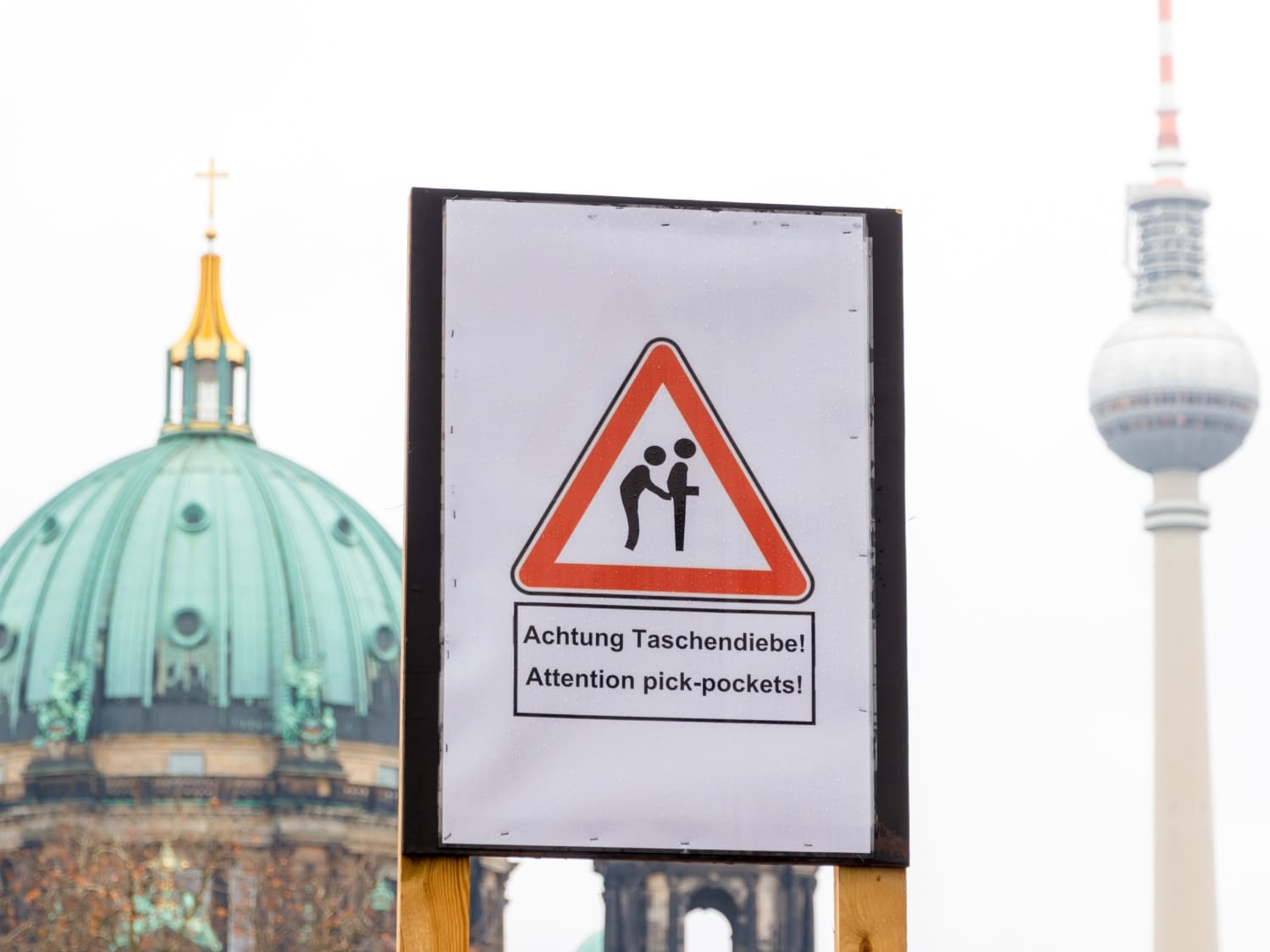
Europe is normally safe and there is very little violent crime. Unfortunately, there are plenty of scammers that want to separate you from your money. This guide will explain how to avoid tourist scams in Europe and the most common traps tourists fall victim to so you won’t do the same.
Pickpockets and Petty Theft In Europe
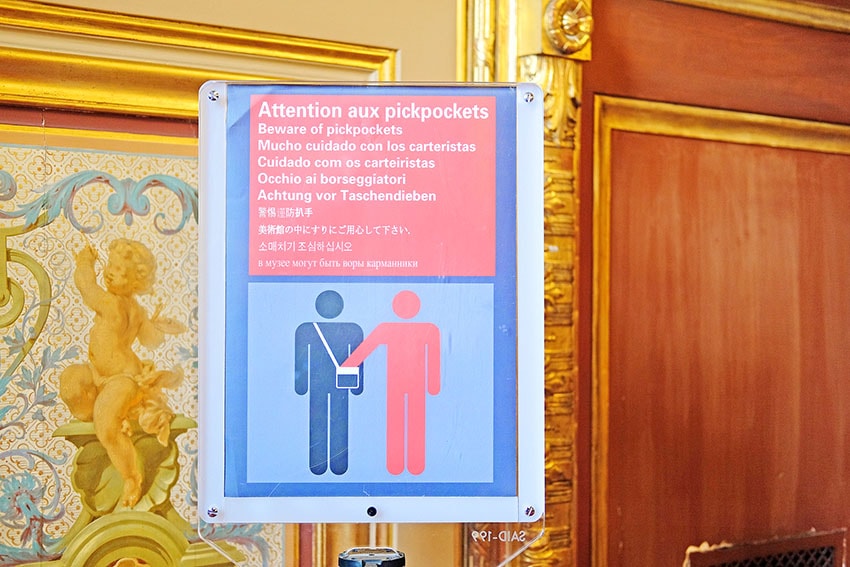
Europe is world-famous for its pickpockets. That’s because travelers tend to carry around a lot of expensive (and easy-to-steal) electronics so you’re a prime target. It is easy to get your money/phone stolen in an instant so you need to be vigilant.
Here are some tips on how to avoid becoming another pickpocketing victim:
Beware Of Crowds
Busy streets, crowded subway cars, buses, trains, and places with a lot of tourists attract thieves. That person brushing up against you might be trying to sneak his hand into your bag. Know where your valuables are at all times and don’t let your guard down.
Watch Your Bag/Purse
Always look after your stuff. Setting your bag or purse on the ground while you eat is an invitation for a thief to steal it. If you’re going to set it down, put your leg through the straps so you’ll feel when someone is trying to take it. Make sure your purse has a zipper—multiple zippers are even better.
Keep Your Phone Safe
Smartphones are the most-stolen item in Europe so don’t leave your phone on the table while you’re at a bar/restaurant.
Extra Safety
While uncommon, some thieves will use a knife to cut your bag open so you really have to be alert. Some bag manufacturers make bags with steel cables woven into the material. This helps prevent someone from cutting into your bag.
Lock Your Zippers
You can get little luggage locks for your bag’s zippers. You can also use twist ties. Thieves want easy targets so even a twist-tie is enough to make them move on to an easier target.
Beware of Distractions: Most pickpockets work in teams. One person distracts you with a map or something similar, and the other person swipes your stuff. Groups of little kids are also used as distractions.
Keep Your Wallet Safe
Keeping your wallet in your back pocket is a pickpocket’s dream, so keep it in your front pocket. I also suggest wrapping a rubber band around your wallet because it makes it much harder to slip out of your pocket without being noticed.
Money Belt
Honestly, I hate money belts. They are annoying and uncomfortable. I wore mine for about 5 minutes before taking it off. But, many people swear by them. Wear one if it makes you feel safe.
Fake Wallet
Some people have mentioned about keeping a fake wallet full on expired credit cards/old Blockbuster cards and maybe a few euros. This way a pickpocket will hopefully steal this unimportant wallet. It might also come in handy if you ever get mugged.
Don’t Show Your Wealth
Don’t wear expensive jewelry and don’t show off your fancy camera/smartphone when you’re not using it.
Secure Your Bag To Something
The “snatch-and-run” is a very popular, especially on trains and buses. I like to use a retractable cable lock to attach my bag to the seat or luggage rack on the train or to my bedpost in the hostel. This will be enough of a deterrent to stop someone from running by and grabbing your bag.
Lock Up Your Stuff
Lock up your valuables in the hostel. Pretty simple.
Read More: [Tips For Avoiding Pickpockets in Europe]
ATM & Credit Card/Debit Card Fraud In Europe
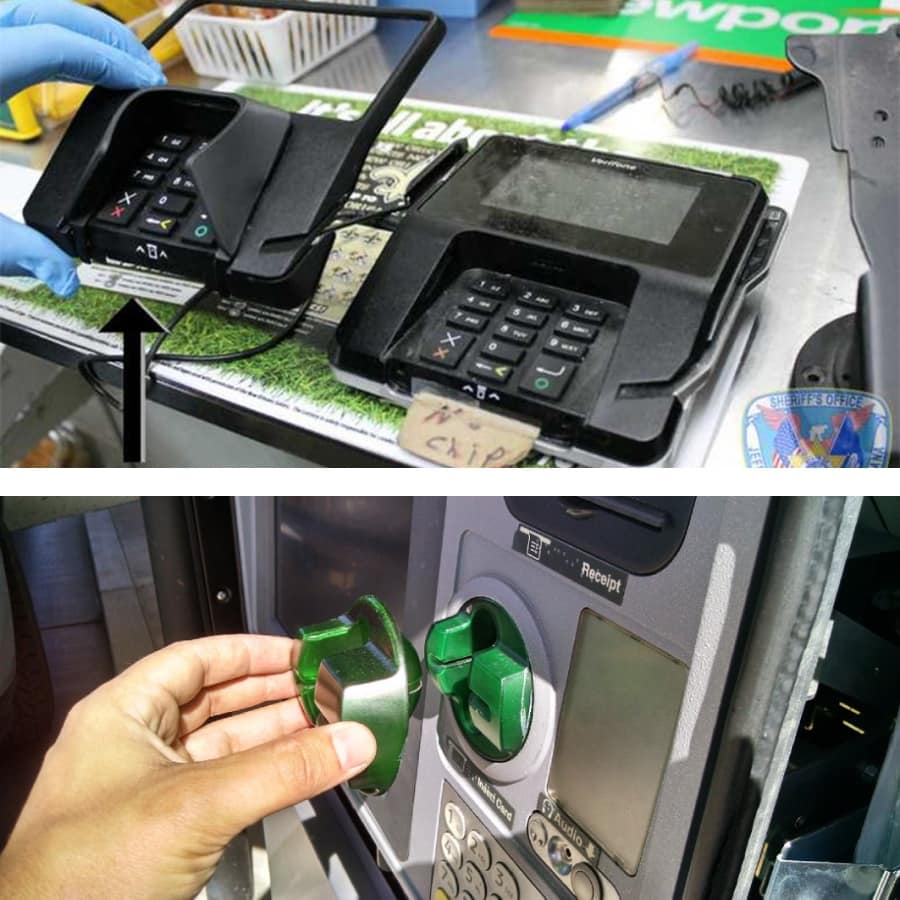
High-tech theft is on the rise in Europe—it is hard to fully avoid but there are a number of things you can do to avoid being a victim.
Credit/Debit Card Skimming
It is EXTREMELY easy to “clone” a credit card and this crime is the largest source of bank fraud today.
Use your phone to make mobile payments (Apple Pay, Google Pay, etc.) whenever possible! Mobile payments are encrypted so they can’t be skimmed—it’s 100% the safest way to pay for things. And 99% of businesses in Europe that accept credit cards will accept mobile payments.
As for card skimming, all the thief needs to do is swipe your card through a tiny machine that records all the info from your card’s magnetic strip. The devices are cheap and easy to buy online. Most often this crime is committed by waiters and shopkeepers. Sometimes they’ll make charges right away but they’ll often wait months before they make a charge.
Important: Only use a credit card to make in-person purchases. Never use your debit card to make purchases—your debit card should be solely used at the ATM. If your debit card is compromised your bank will cancel the card and you’ll no longer be able to use ATMs—so you won’t have access to cash.
Better yet, link your debit card to your mobile pay and only use your phone at the ATM.
ATM Scams (Skimming Devices, Hidden Cameras, Pickpockets, etc.)
ATMs are a favorite target for scammers throughout Europe so there are multiple things to consider when using the ATM.
First, beware of skimming devices that have been installed on the ATM—these are designed to steal your card information. This is a pretty advanced technique so it can be difficult to detect. I suggest poking around the ATM to see if anything feels “loose” or looks out of place. Always check the card slot to see if anyone has tampered with it.
Personally, I recommend using ATMs that are inside a bank because scammers tend to only install skimmers on outdoor ATMs. That said, outdoor ATMs are much more common so it’s not always possible to find one inside.
Also, pay attention to pickpockets while using the ATM. I suggest using the ATM only when you’re with a buddy or go inside a bank.
Taxis Scams in Europe
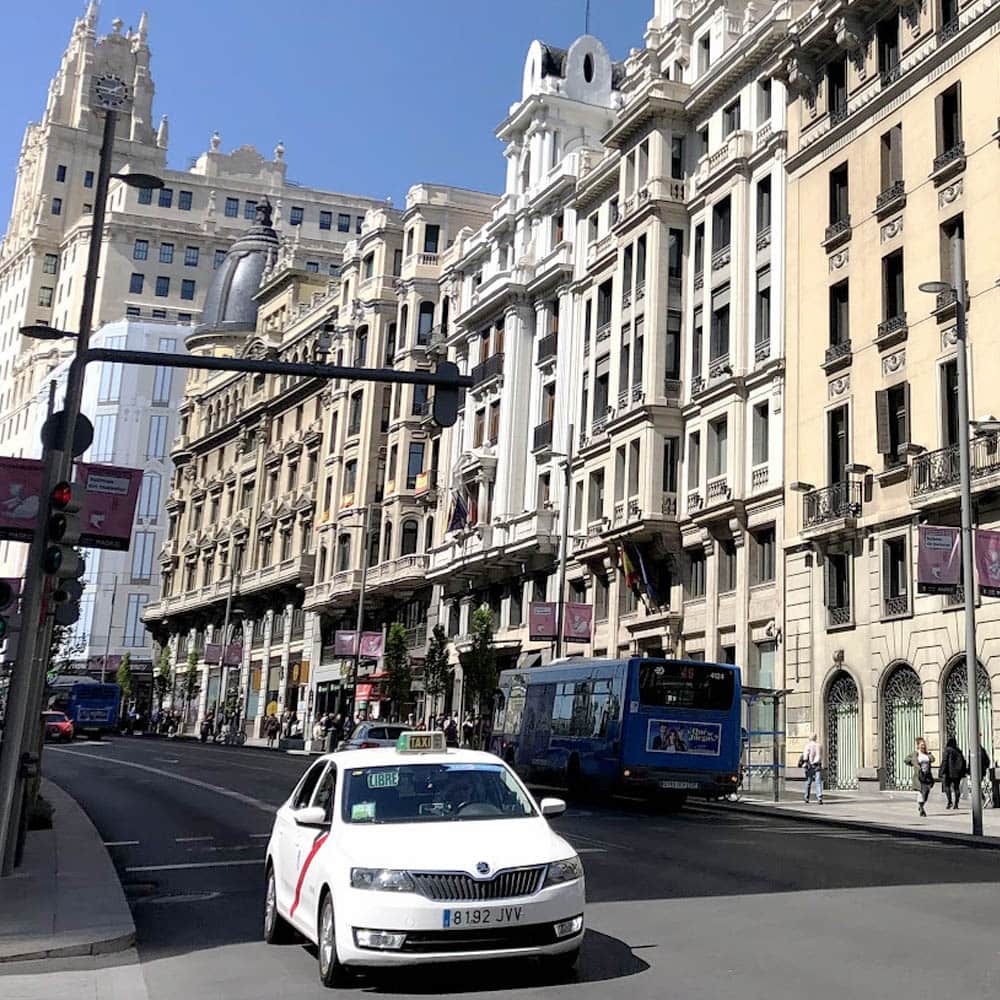
The dreaded taxi. It feels like even the honest ones are trying to rip you off. Unfortunately, there are plenty of drivers who set out to scam unsuspecting tourists—especially in Eastern and Southern Europe.
Here are some tips for using taxis in Europe:
Use Uber or Local Taxi App
The best way to avoid taxi scams is to use Uber (or the local equivalent) or the official Taxi App (if it exists). Payments are automatic so you don’t have to deal with in-person payment.
Some countries have banned Uber but official taxi companies often have an Uber-like app.
Use Official Taxis Only
Every city will have officially licensed taxis (they’re typically all decorated the same) so avoid “private cars” that can set any price they choose. Official taxis are required to charge a standardized fee—although that doesn’t stop some drivers from trying to rip you off.
Some cities allow taxis to charge small extra fees for luggage and excess passengers so do a little research to know what charges are legit and which aren’t.
Hail Taxis At The Taxi Stands
It’s not common to hail a taxi on the street in Europe. Taxis are typically only allowed to pick up passengers from official taxi stands—which you’ll find all over the city.
Go By The Meter
Many drivers will claim the meter is “broken” or they won’t turn it on—they’re always going to rip you off in these cases. Insist that they turn it on.
Leave if they don’t.
Or they might tell you a price that’s higher than what’s on the meter. Again, don’t fall for this scam.
Ask Hotel About Typical Taxi Prices
An unbiased third party should be able to give you a pretty close guess as to how much you should be paying for your ride. Ask the cab driver for this estimated cost when you get in and compare the two.
Carry Small Bills
If the taxi doesn’t take credit cards, be sure to carry small bills because some drivers may “claim” to not have change for larger bills.
Be Slow Counting Your Money
Hand your money to the driver slowly, bill by bill. Then make sure you get all your change back. Double check.
Pretty Girls/Strip Clubs Scams

Think you’re Ricco Suave? Think again because you could be getting scammed.
Pretty Girls Scam
A super common scam involves a pretty girl and alcohol. They’ll randomly flirt with men and will eventually ask them to go to a bar/club/restaurant that they know. At the bar, they’ll ask that they buy them a drink. What the victim doesn’t know is that the girls and the bar are scamming them. Each drink cost $500+ (they don’t tell you this) and at the end of the night, you’re stuck with a $1000+ bill.
Magically the girls are nowhere to be found, but they’re replaced by a few scary dudes who want their money. They’ll happily escort the victim to the nearest ATM while you withdraw your cash. This scam is very widespread in Eastern Europe, but it happens everywhere. Many times the police won’t do anything about it.
So if you want to buy a girl a drink I suggest asking the price upfront and then paying as you go. This way you won’t have a surprise bill at the end of the night. If they refuse to let you pay you should just leave the bar ASAP.
I also suggest carrying only enough for a few drinks when you go out at night. Leave the cards at home so if you find yourself in this situation you won’t have any money to give them.
Strip Clubs
I advise against going to strip clubs because tourists are scammed there all the time. Much like the scam above, you’ll be charged exorbitant amounts for drinks/talking to the hostess/whatever else you do at a strip club.
I have a friend who went to a strip club in Paris and they quoted him one price and then they charged him something different. They held him at knifepoint until he forked over the dough (about $700). This happens multiple times a day and the police aren’t too concerned.
Other Money Scams
There are plenty of other money-related scams so let’s take a look at the most common scams.
Tourist Menu Change
Some scummy restaurants will have two menus—one with normal prices and then another with higher prices. They’ll show you the normal price when you order and then they’ll give you a hefty bill. When you protest they’ll show you the menu with the high prices.
Fake Undercover Police
A common scam involves “undercover” police wanting to check your money because they claim you have counterfeit bills. They’ll inspect your money and trade it out for small bills without you noticing. They’ll often flash a badge to make it all look official. Plainclothes officers don’t deal with tourists so ask them to bring a police car before you’ll give them any access to your cash.
Street Money Changers
Never change money in the street. It is usually illegal and you’re going to get ripped off. If you need to change money, go to an official change office.
Short Changed
A shopkeeper, taxi driver, or server will probably try to short-change you at least once during your trip. It is the worst in countries that don’t use the euro because the money is so foreign to tourists. Make sure you count all your money carefully before leaving the register.
Unsecured Wifi, Internet Cafes, & Hostel Computer Scams In Europe
Be wary when using a free wifi network as some are designed to intercept all the traffic on the network—which means a scammer can see everything you’re doing. It’s much safe to always use mobile data—check out my guide to getting cheap mobile data for Europe.
While traveling many people use public computers to book future travel plans, check email, and update social media. Unfortunately, the computers in internet cafes, hotels, and hostels can be full of really nasty software designed to steal your information. I would assume that every computer you use is going to be infected in some shape or form.
- Key Loggers: Many computers have “key loggers” installed. These programs record everything you type.
- Viruses: Many computers are infected with viruses and the virus can do all kinds of harmful things.
- Much More: There is too much to list when it comes to computer scams.
Mugging in Europe
Violent crime in Europe is generally very minimal, but there are some cases of muggings. Don’t make yourself an easy target and you shouldn’t have any problems.
- Don’t walk around with your phone in your hand for long periods of time.
- Don’t wear flashy jewelry.
- Stash your expensive electronics.
- Stick to busy, well-lit streets at night.
- Be aware when withdrawing money from an ATM.
- Walk with confidence. Muggers want to attack the weak.
Con Man Tourist Scams
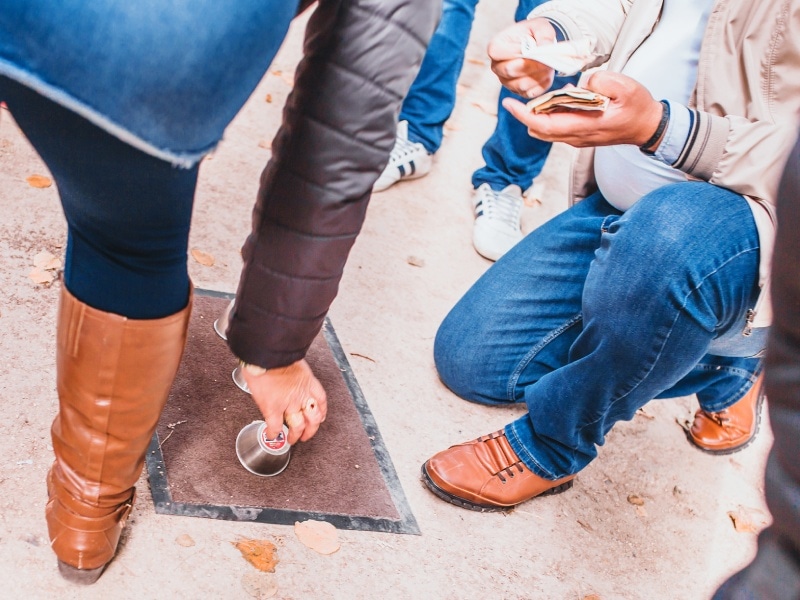
There are plenty of conmen (and women) you might experience while you’re traveling around Europe.
Donation/Petition Scam
Anyone who asks you to sign a petition and give a donation is a scammer. The money goes to organized crime gangs. And to add insult to injury, sometimes the scammers will try pickpocketing you while you’re signing the petition.
This scam is typically performed by small groups of young women.
Lost Ring Scam
Never pay someone who gives you a ring that they claim they found a ring on the ground.
Friendship Bracelets Scam
The friendship bracelet scam involves someone coming up to you and tying a piece of string around your wrist and then demanding payment for it. It’s best to completely ignore them.
This is also used as a distraction for pickpockets.
Three-Card Monte
Any kind of card game (or any game involving winning money) on the street is a scam. These attract large groups who want to check out the action… but the crowd is also full of pickpockets.
“Helpful” Locals at Train Stations
Most people are helpful, but some take advantage of you. I’ve heard of scammers helping tourists buy train tickets but instead, they buy child tickets and pocket the rest of the money. Be very careful of who you trust.

No Funny Business
The Savvy Backpacker is reader-supported. That means when you buy products/services through links on the site, I may earn an affiliate commission—it doesn’t cost you anything extra and it helps support the site.
Thanks For Reading! — James
Questions? Learn more about our Strict Advertising Policy and How To Support Us.





